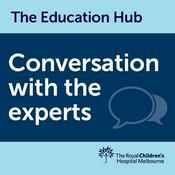This podcast is for any health professional wanting to learn more about how to provide best-practice clinical care for children and their families. In each episode, experts from The Melbourne Children’s Campus (a collaboration between The Royal Children’s Hospital, University of Melbourne and the Murdoch Children’s Research Institute) provide advice and insights, tips and tricks, and discuss latest research findings on a range of topics. As well as clinical and research-focused episodes, you will also find episodes that can help you and your team perform at your best in times of high stress. To find out more about The Education Hub, please visit: education-hub.rch.org.au
The Education Hub Learning Resource Disclaimer
This information is intended to support the education of health professionals. The authors have made considerable efforts to ensure the information contained in this resource is accurate, evidence-based, and up to date at the time of publication however the information and advice offered is intended as a guide only and does not replace the need for clinical expertise and the application of clinical judgment to each individual presentation. Users of this resource are strongly recommended to confirm that the information contained is correct by way of independent sources and appropriate to their context. The Royal Children’s Hospital accepts no liability, however arising, for any inaccuracies or information perceived as misleading and makes no representations as to the success of any treatment recommended in the resource.
Statement to intellectual property
These educational materials are the intellectual property of The Royal Children’s Hospital and may not be reproduced, transmitted, displayed, published, or modified without prior written permission. Contact
[email protected] to make a request.



